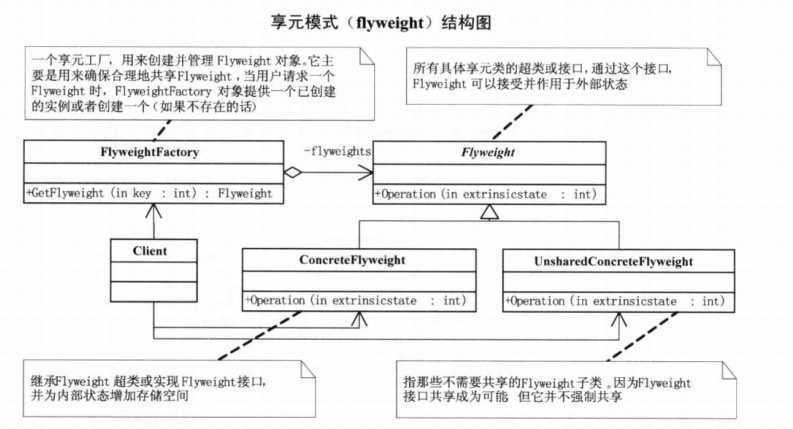享元模式(Flyweight),运用共享技术有效地支持大量细粒度的对象
个人认为,其实享元模式,就是共享相同的对象,通过相同的对象和不同对象之间的组合达到满足多样需求的目的。
享元模式可以避免大量的非常相似类的开销。在程序设计中,有时需要生成大量细颗粒度的类的实例来表示数据。如果能发现这些实例除了几个参数外基本上都是相同的,有时就能够大幅度地减少需要实例化的类的数量。如果能把那些参数移到类的实例的外面,在方法调用时,将他们传递进来,就可以通过共享大幅度地减少单个实例的数目。
比如下棋,一盘棋有361个空位可以放棋子,难道我们就应该创建361个棋子对象才能下一盘棋吗,其实这里面棋子外形都是一样的,所以只需要实例化一个棋子(此为共享的对象),然后用另一个类来表示颜色和位置。这样就有效的减少了实例化棋子的数量,减少了存储空间上的开销。

// Flyweight接口类 #ifndef _FLYWEIGHT_HPP #define _FLYWEIGHT_HPP class Flyweight{ public: virtual void myOperation(int) = 0; }; #endif
// ConcreteFlyweight类 #ifndef _CONCRETEFLYWEIGHT_HPP #define _CONCRETEFLYWEIGHT_HPP #include"flyweight.hpp" #include<iostream> using namespace std; class ConcreteFlyweight:public Flyweight{ public: virtual void myOperation(int extrinsicState)override{ cout << "ConcreteFlyweight: " << extrinsicState << endl; } }; #endif
// FlyweightFactory类 #include<map> #include<string> #include"concreteflyweight.hpp" using namespace std; class FlyweightFactory{ public: Flyweight* getFlyweight(string str){ map<string,Flyweight*>::iterator it; it = flyweightMap.find(str); if(it != flyweightMap.end()){ return it->second; } else { auto tmp = new ConcreteFlyweight(); flyweightMap.emplace(str,tmp); return tmp; } } int getCnt(){ return flyweightMap.size(); } private: map<string, Flyweight*> flyweightMap; }; #endif
// UnsharedConcreteFlyweight类 #ifndef _UNSHAREDCONCRETEFLYWEIGHT_HPP #define _UNSHAREDCONCRETEFLYWEIGHT_HPP #include<iostream> #include"flyweight.hpp" using namespace std; class UnsharedConcreteFlyweight : public Flyweight{ public: virtual void myOperation(int extrinsicState)override{ cout << "UnsharedConcreteFlyweight: " << extrinsicState << endl; } }; #endif
// 客户端代码 #include<iostream> #include"concreteflyweight.hpp" #include"unsharedconcreteflyweight.hpp" #include"flyweightfactory.hpp" using namespace std; int main(){ int extrinsicState = 10; FlyweightFactory* fwFactory = new FlyweightFactory(); Flyweight* fw1 = fwFactory->getFlyweight("#1"); Flyweight* fw2 = fwFactory->getFlyweight("#2"); Flyweight* fw3 = fwFactory->getFlyweight("#3"); fw1 = fwFactory->getFlyweight("#1"); fw1->myOperation(extrinsicState--); fw2->myOperation(extrinsicState--); fw3->myOperation(extrinsicState--); UnsharedConcreteFlyweight* ufw = new UnsharedConcreteFlyweight(); ufw->myOperation(extrinsicState--); cout << "The objects number: " << fwFactory->getCnt() << endl; getchar(); return 0; }
运行结果

原文:https://www.cnblogs.com/yb-blogs/p/12635059.html